Table of contents:
A podcast website isn’t optional anymore. It gives you the opportunity to own your audience, monetize your brand, and boost your discoverability through SEO.
But the very idea of creating a website on your own feels daunting, doesn’t it? Well, you don’t need to be a web developer to build a great one.
This guide includes 25 of the best podcast websites on the internet - plus the tools you’ll need to build one of your own.
Do I need a website if I have a podcast?
You don’t need a website to run a podcast, but it’s one of the best ways to grow and engage your audience.
A podcast website acts as your show’s home base. It’s a web page or site where listeners can find episodes, learn about you, and connect with your brand.
Here are some major benefits that are hard to overlook:
Central hub for your brand: A podcast website gives your show and related content one home, with full control over design, messaging, and updates. You can consistently control all your links, bios, blog posts, and merchandise in one place.
Search-friendly: A website is a cornerstone of any podcast SEO strategy. It makes it easier for people to find your podcast on Google and other search engines. By including keywords and episode details, you can show up in search results and attract new listeners.
Professionalism: A well-designed site makes your show look more credible and helps you stand out. You can use it to enhance your branding and build a memorable reputation.
Monetization: A website can also help you expand your monetization options. You can connect your podcast to premium content, sponsorships, donations, merchandise, or other monetizing features.
Email lists: A website allows you to use subscription forms to capture your visitors’ emails and build a loyal listener base you can communicate with.
Easy cross-promotion: A website URL can be used as the only link you need to share across platforms and social media to cross-promote your show effectively.
25 best podcast websites examples in 2026
Looking for inspiration from some of the best podcast websites on the internet? Here are 25 of the best podcast websites and what you can learn from them.
1. Huberman Lab

Website builder: Custom
Why we like this website:
This clean, professional website mirrors the Huberman Lab podcast’s focus on science-backed advice about the brain, behavior, and health. It’s both a podcast page and a knowledge hub. Each episode page includes resources and academic references so listeners can dig deeper into the topic. Huberman’s personal brand as a Stanford neuroscientist is woven throughout the site.
What stands out:
- AI-powered search function “Ask Huberman Lab” to access any content efficiently.
- Topic-based episode filtering (e.g., Aging, Hormone Health, etc.) for fast discovery.
- Academic references and referenced studies listed with every episode.
2. Jay Shetty
.webp)
Website builder: WordPress
Why we like this website:
The polished site for the popular Jay Shetty podcast shines a spotlight on its creator - and his high-powered guests. It’s designed to build trust and cleanly link to Shetty’s various lines of business, including coaching, products, books, and speaking.
Did you know Jay Shetty records on Riverside? You can too! Learn more or sign up to start creating podcasts in studio-quality.
What stands out:
- Highly cinematic dynamic intro with feature video.
- Homepage highlights press mentions and accolades.
- Encourages user engagement across multiple channels (podcast, tour, coaching, books, etc.).
3. Joe Rogan
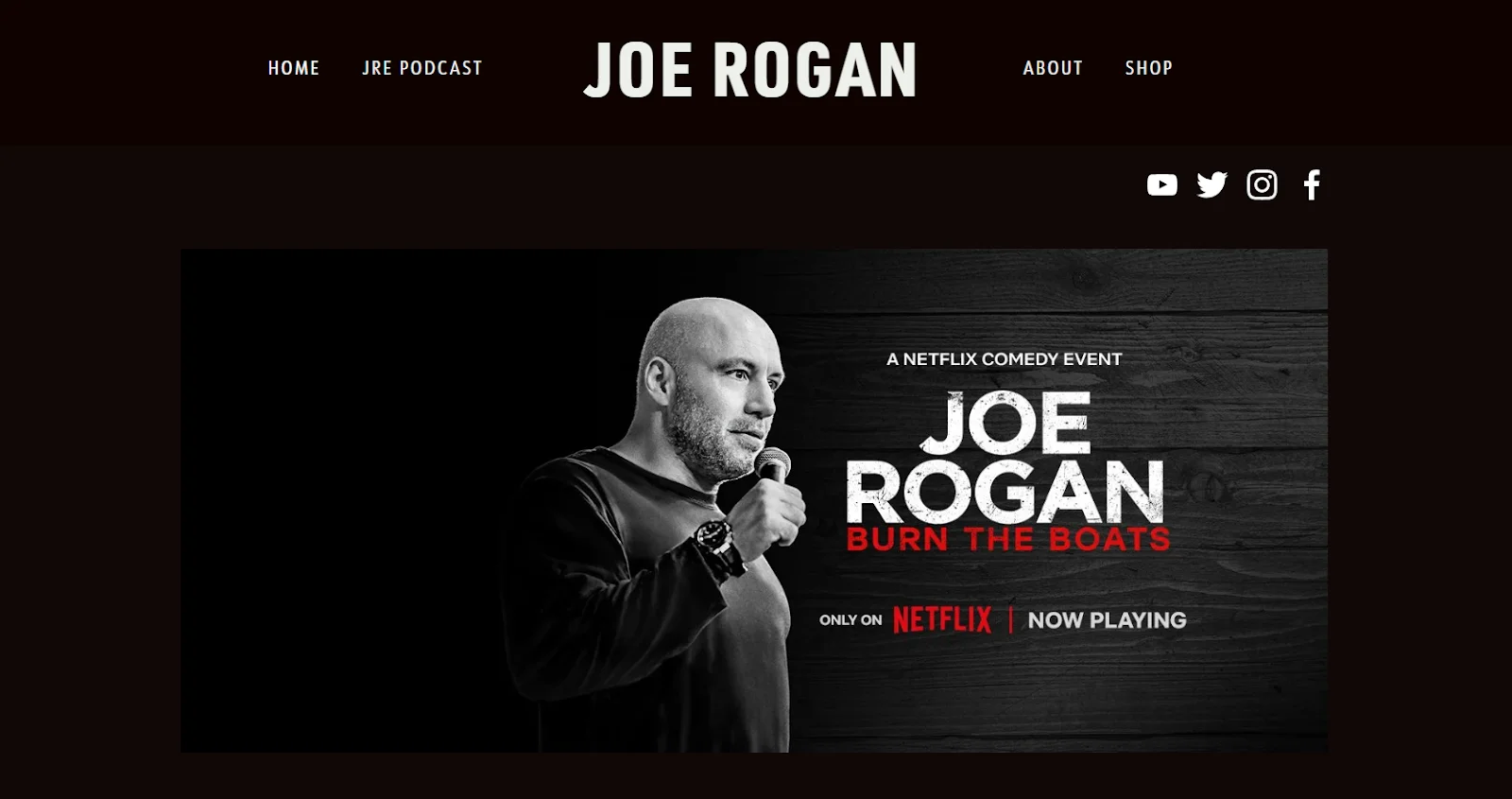
Website builder: Squarespace
Why we like this website:
This website keeps things simple but is full of information. Going beyond just podcast content, the Joe Rogan site also includes biographical statements, contact details, and social media integrations. Site visitors can access information about new merch and upcoming tours, bringing podcasting to the real world.
What stands out:
- Everything is in one single, straightforward page.
- Direct links for listening on Spotify or buying merchandise.
4. The Friday Habit

Website builder: Squarespace
Why we like this website:
The Friday Habit’s website is bright, cohesive, and it gets to the point. You get a sense of the show, links to listen, and a downloadable guide as soon as you land. The bold branding is the central focus. Plus, an easy-to-spot navigation menu and CTA, directs site visitors straight to podcast content.
What stands out:
- Prominent CTA to download a free guide to capture emails.
- Strong visual branding that matches the podcast’s tone.
- Simple top navigation with clear paths to listen or subscribe.
5. The NewsWorthy

Website builder: Squarespace
Why we like this website:
NewsWorthy’s site is all about the details. Calls to action are used consistently throughout, so visitors always know what steps to take next. The podcast is the website's main focus, but it's also easy to access other related non-podcast information.
What stands out:
- Sleek top navigation bar that doesn’t take up much space.
- Newsletter sign-up form built into homepage.
- Easy to play the latest episodes directly from the homepage.
- Links to media coverage and host background for credibility.
6. Teddi Tea Pod

Website builder: WordPress
Why we like this website:
This podcast website has celebrity status at heart. Teddi Tea Pod's website highlights the host’s credentials for talking about entertainment. All while integrating podcast content effectively with other business details and information.
What stands out:
- Host bio and media featured front and center to build trust.
- Integrated podcast player and episode library.
- Lots of callouts to other business offerings like coaching and products.
7. Twenty Thousand Hertz

Website builder: Squarespace
Why we like this website:
This site is bright, clever, and intuitive. It features a great range of design integrations, along with user-friendly navigation and captivating visual content. Memorable graphic elements help site visitors associate the website directly with its purpose. Twenty Thousand Hertz's site also makes it easy for visitors to subscribe as returning podcast listeners.
What stands out:
- Visually-appealing custom illustrations and on-brand artwork.
- Very prominent latest episode right on the home page.
- Clear visual storytelling that enhances brand recall.
8. The WPMRR Podcast

Website builder: WordPress
Why we like this website:
The WPMRR website features clear, cohesive branding, and easy navigation. This site uses a range of well-chosen widgets that allow for effective podcast content integration across multiple platforms. There are so many ways to listen!
What stands out:
- Straightforward page with all the episodes in a long list.
- Every episode includes a full transcript for easy searching and powerful SEO.
- Full list of social widgets for easy cross-promotion.
9. Gabby Bernstein
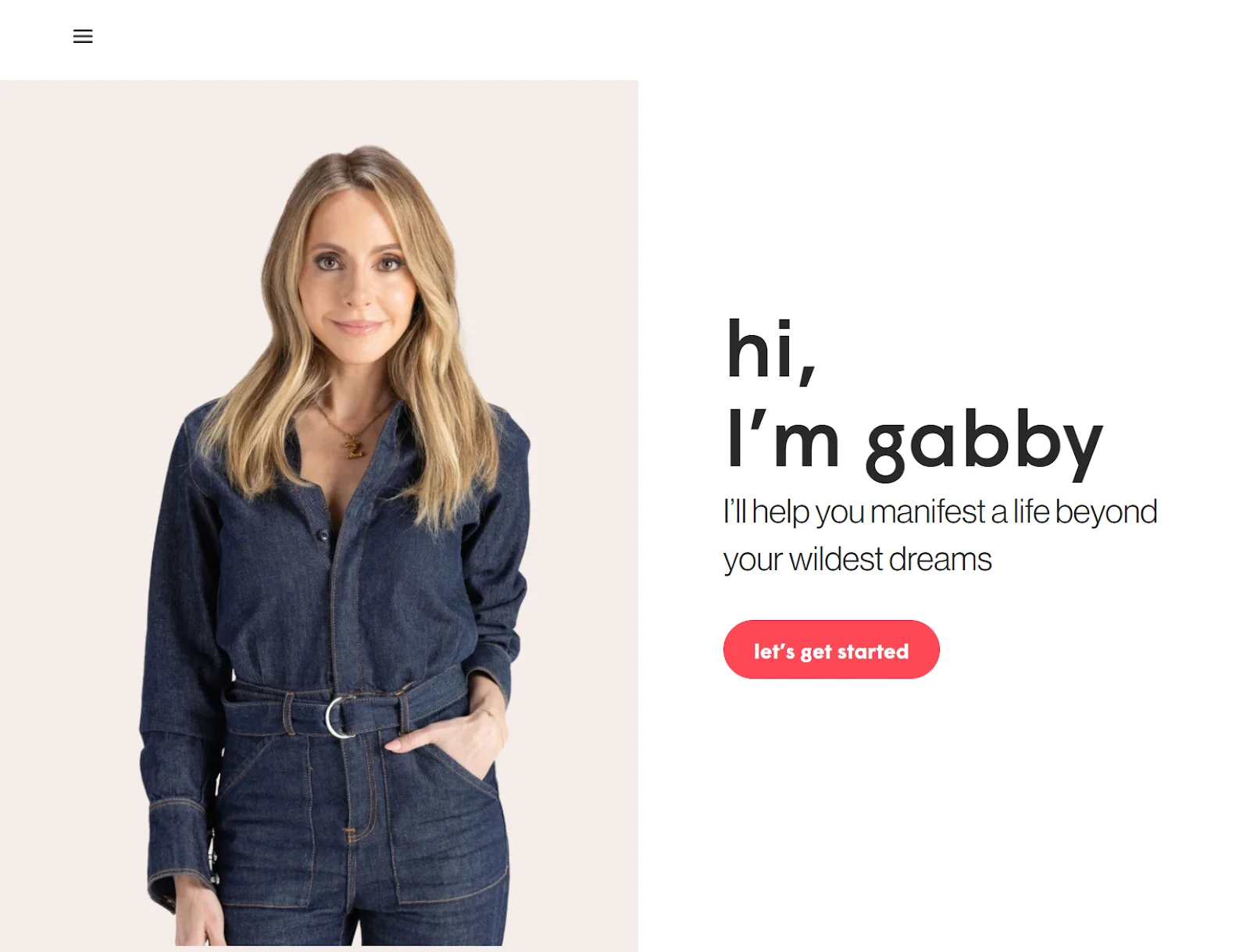
Website builder: WordPress
Why we like this website:
The Gabby Bernstein podcast is known for the creator’s straight talk and authenticity. It only makes sense that they’d put that creator front and center. This helps site visitors associate the voice with the content. The website shows Bernstein’s credentials, showing why you should trust her. It then directs users to podcast content and other information and resources using minimalist navigation tools.
What stands out:
- Calls to action for both podcast, merchandise (books), and coaching content.
- Strong focus on personalized brand across the whole site copy.
- Mobile-friendly layout with embedded player.
10. Congratulations

Website builder: Squarespace
Why we like this website:
The Congratulations podcast is known for two things: Its spontaneous, goofy host, Chris D’Elia, and the surreal and often bizarre characters he creates. The show’s website features D’Elia as an off-kilter action hero - perfect! The site also makes podcast content its key priority, with a media player front and center.
What stands out:
- Homepage episode feed with media player.
- Minimal navigation to reduce distractions.
- HUGE CTA pointing to their Patreon profile for donations.
11. Laura Dawn
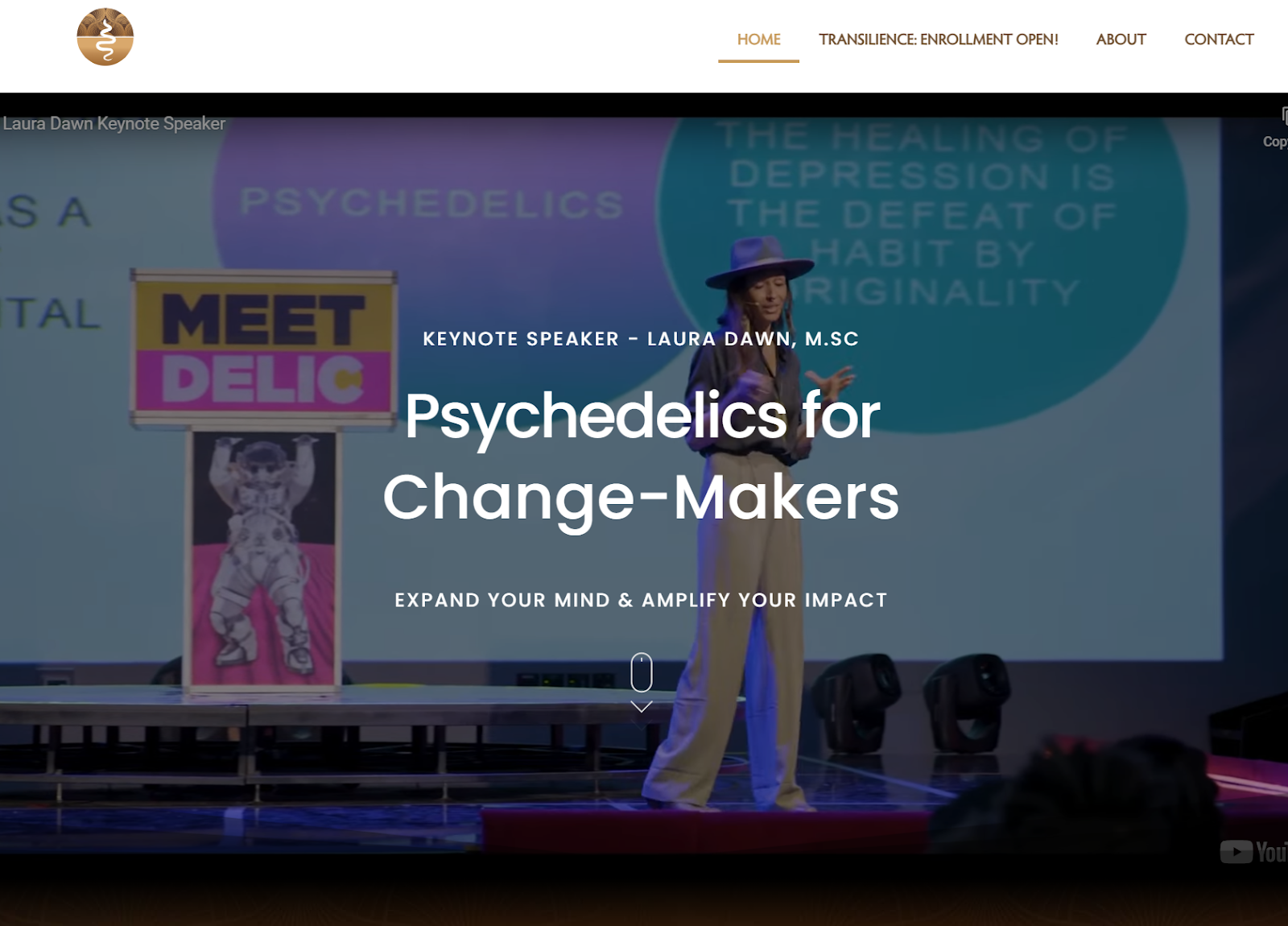
Website builder: WordPress
Why we like this website:
Laura Dawn's website allows users to browse and listen at the same time! It also puts Dawn’s expertise in psychedelics - an unusual area of study - front and center. She is presented as an expert in her field and, therefore, someone worth listening to. A podcast player tool is tethered to the bottom of the screen with easy-to-use playback tools. This means that site visitors can listen to new podcast episodes while discovering other site content, all without having to leave the website.
What stands out:
- Elegant aesthetic that perfectly encapsulates the podcast’s theme and brand image.
- Featured downloads to capture emails.
- Multi-use navigation for content, courses, and episodes.
12. Song Exploder

Website builder: WordPress
Why we like this website:
This site is true to the podcast format, making podcast episodes the key feature of its homepage while also paying close attention to the power of social media advertising. New Song Exploder episodes are easy to find in feed format, and they stand out with well-written descriptions and bright episode covers integrated directly from Instagram.This site is true to the podcast format, making podcast episodes the key feature of its homepage. It also pays close attention to the power of social media advertising. New Song Exploder episodes are easy to find in feed format. They stand out with well-written descriptions and bright episode covers integrated directly from Instagram.
What stands out:
- Instagram-style feed for recent episodes.
- Well-written, highly scannable show notes.
- Custom, on-brand artwork for each episode.
13. My Favorite Murder
.webp)
Website builder: Custom
Why we like this website:
The My Favorite Murder website makes it easy to find everything you’re searching for! Featuring great visual branding elements, the site directs users immediately to the action. On the home page, visitors will discover new podcast episodes and merchandise offers. The site also features a members section, where paying subscribers can access extra content. Plus, true crime fanatics are bound to love the dark, creepy design.
What stands out:
- Members-only content section.
- Integrated merch store.
- New episode highlight on homepage.
14. MrBallen (Ballen Studios)
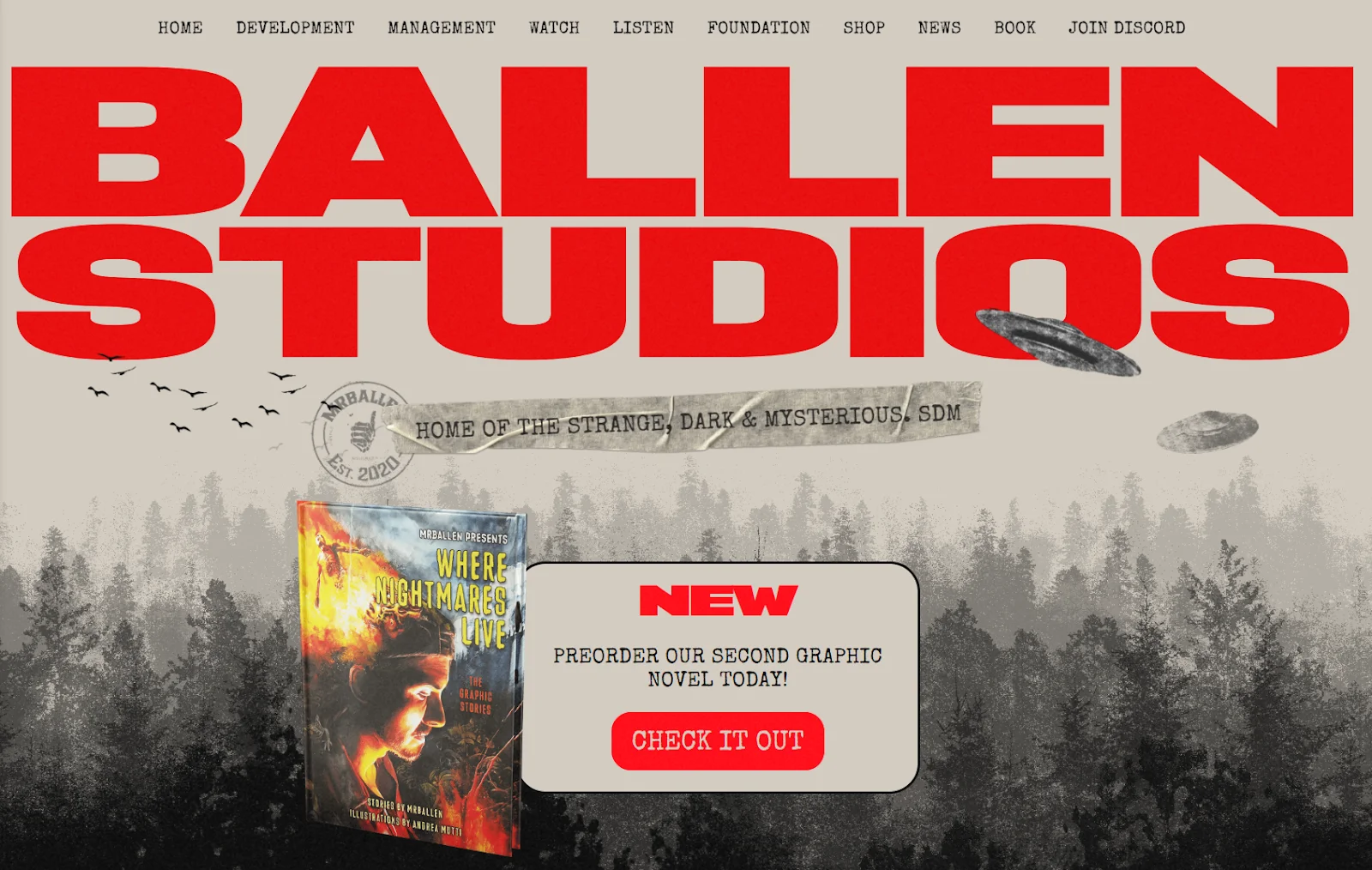
Website builder: Custom
Why we like this website:
Just like his podcast series, MrBallen’s website, Ballen Studios is all about storytelling. It features a cinematic, studio-level design that promotes multiple shows, including the viral MrBallen Podcast and a distinct ‘90s vibe. It balances discovery, branding, and monetization without overwhelming the visitor.
What stands out:
- Hero section quick-link highlights multiple shows under the Ballen brand.
- Large, high-impact font with crisp HD imagery gives a retro feel.
- Strong use of video and cinematic visuals.
- Direct links to podcast platforms, merch, and social.
15. Office Ladies

Website builder: Squarespace
Why we like this website:
This podcast revisits episodes of “The Office” with two of its stars - it’s no wonder they put its co-hosts front and center. The website delivers clear information about what the Office Ladies is about, as well as clear links to subscribe, listen, and even submit a question to be answered on a future show.
What stands out:
- Easy access to listen, shop, and subscribe.
- Quick show notes with a clear description of each episode.
- Full focus on the listening experience with prominent current and featured episodes.
16. Emma Gannon
.webp)
Website builder: Squarespace
Why we like this website:
With colorful images and effective communication, this website tells visitors exactly where they are and who the host of this podcast is. The Emma Gannon site offers clear communication, along with a detailed navigation menu to help users find their way to new content.
What stands out:
- First-person introduction and direct-gaze portrait offer an intimate intro to the host.
- Unique visuals with soft and vibrant colors highlight the host’s personality.
- Smooth navigation on both desktop and mobile devices.
17. Vertical Farming

Website builder: Podcastpage.io
Why we like this website:
The Vertical Farming website is direct and focused, with podcast episodes as the main attraction. Visitors see the latest episode right away. Detailed episode info and strong branding help attract listeners and improve search visibility.
What stands out:
- Lots of content and rich episode metadata to optimize for search engines.
- Voicemail option to leave messages and reinforce personal connection.
- Niche topics clearly communicated in headlines.
18. How Did This Get Made?
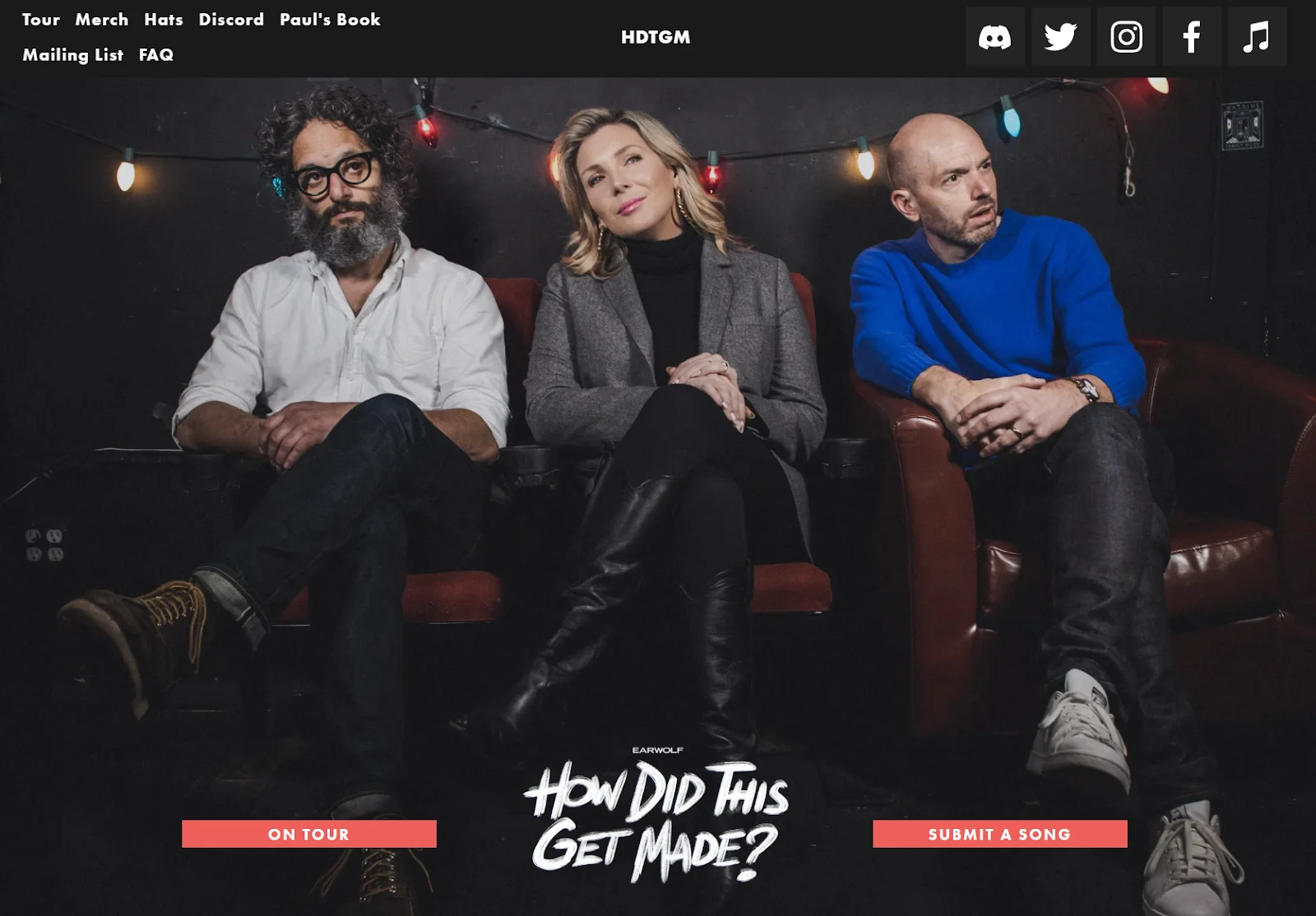
Website builder: Squarespace
Why we like this website:
How Did This Get Made? is a podcast about bad movies. Its website captures the show’s tone and gives fans everything in one place: episodes, contact details, social links, and a mailing list. There’s even an FAQ section to help answer common audience questions.
What stands out:
- FAQs section adds value and makes the website even easier to navigate.
- Contact and “submit a song” options built into the site.
- Embedded episode player right on the homepage.
- Branded visuals tied to the show’s tone.
19. The Ramsey Show

Website builder: Custom
Why we like this website:
As a show that aims to provide financial guidance, the Ramsey Show’s website acts as more of a launchpad for this topic. With strong branding and a deep integration between podcast and business content, visitors can find all the resources they need to get their finances on track. This includes podcast episodes, events, articles, books, financial calculators, and much more.
What stands out:
- The podcast is only part of the much broader Ramsey ecosystem (investment options, insurance, real estate, etc.).
- Features a dedicated Ramsey app for easy listening.
- Full list of episodes viewers can watch without leaving the page.
20. Overheard at National Geographic

Website Builder: Custom
Why we like this website:
The Overheard at National Geographic page shows how to integrate a podcast into a larger brand website. It includes episode updates, a show summary, and links to other National Geographic content and formats.
What stands out:
- The page lives inside the greater National Geographic website, but doesn’t get lost in it.
- Seamless tie-in with other NatGeo articles and stunning photography.
- Easy to browse previous episodes filtered by year.
21. Unconquered

Website builder: WordPress
Why we like this website:
This podcast website is making the most of copywriting power! The Unconquered website uses strong copy to hook listeners. Clear episode descriptions give visitors a preview of the content, and dedicated pages for each episode help the show appear in search results.
What stands out:
- Great example of a podcast site built around well-thought-out content.
- Longform, blog-style episode descriptions rich with keywords to support SEO.
- Immediate and clear CTA to subscribe on Substack.
22. Growth Marketer Podcast

Website builder: Podcastpage.io
Why we like this website:
The Growth Marketer Podcast website is simple and easy to navigate. The homepage lists all episodes with an audio player for instant listening, keeping the focus on a smooth user experience.
What stands out:
- Full list of all episodes playable directly on the homepage.
- Lots of resources including community access, guides, and even a job board.
- Prominent red button to subscribe to the podcast.
23. 99% Invisible
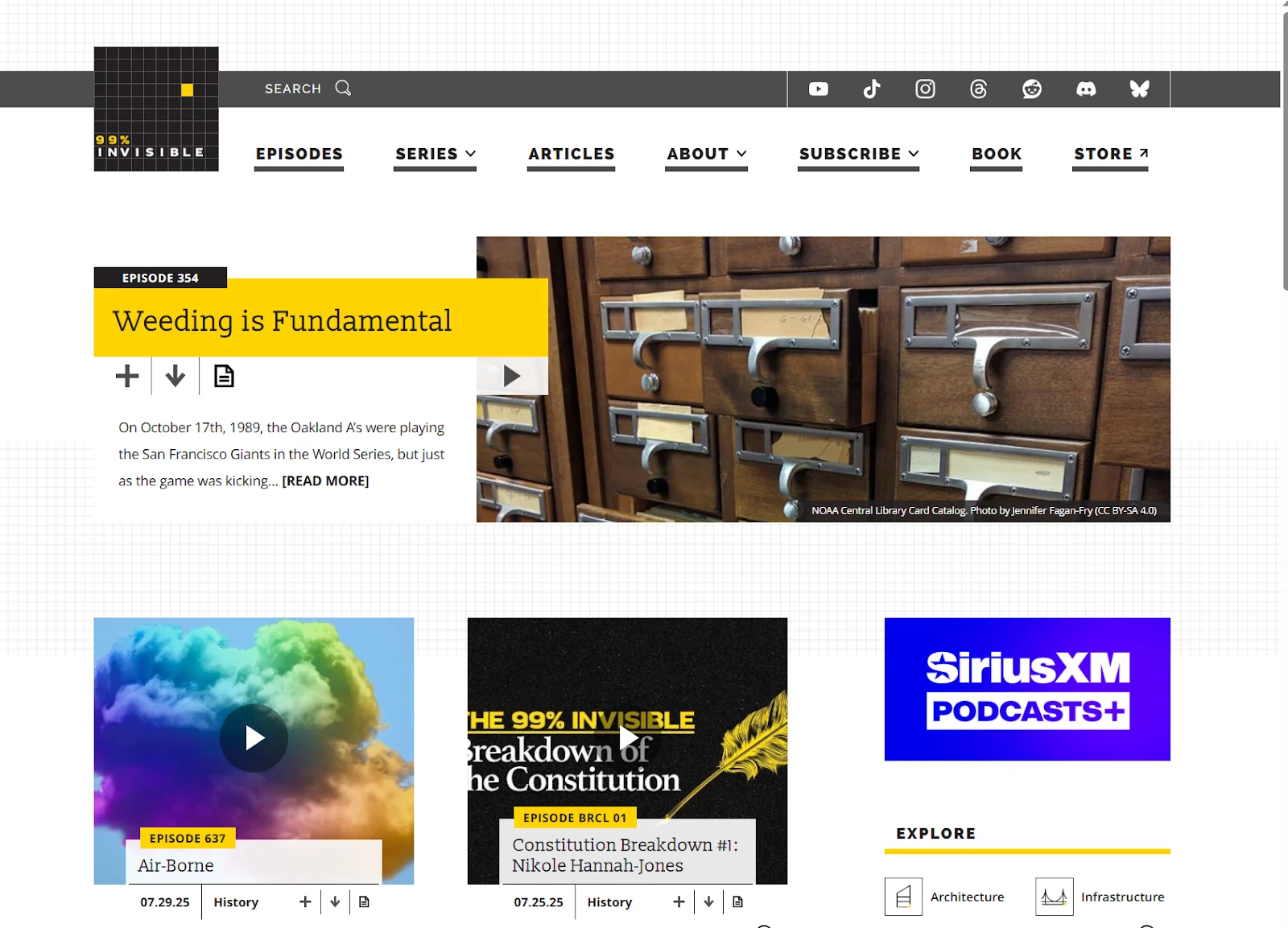
Website builder: WordPress
Why we like this website:
99% Invisible covers design, architecture, and systems, and its website reflects that focus. New episodes appear at the top with built-in playback. Each episode has a full, detailed page, plus easy access to playlists, categories, and archives. This makes the site both listener-friendly and search-friendly.
What stands out:
- Story-driven episode previews with powerful imagery and high-quality thumbnails.
- Can immediately download a transcript or episode straight from the homepage.
- Easy access to categories, tags, and archives.
- Incredibly detailed episode write-ups are worth exploring all on their own.
24. Revisionist History

Website builder: WordPress
Why we like this website:
The Revisionist History website sits within the Pushkin brand, co-founded by host Malcolm Gladwell. It showcases both the show and the wider Pushkin network. Visitors can browse episodes, find links to all major podcast platforms, and easily explore other Pushkin content. This site is a good example of how you can link your site to other podcast channels and directories.
What stands out:
- Links to all major directories for flexible listening.
- Brand continuity within the whole Malcolm Gladwell ecosystem.
- Clean episode index organized by seasons.
25. The Why Files
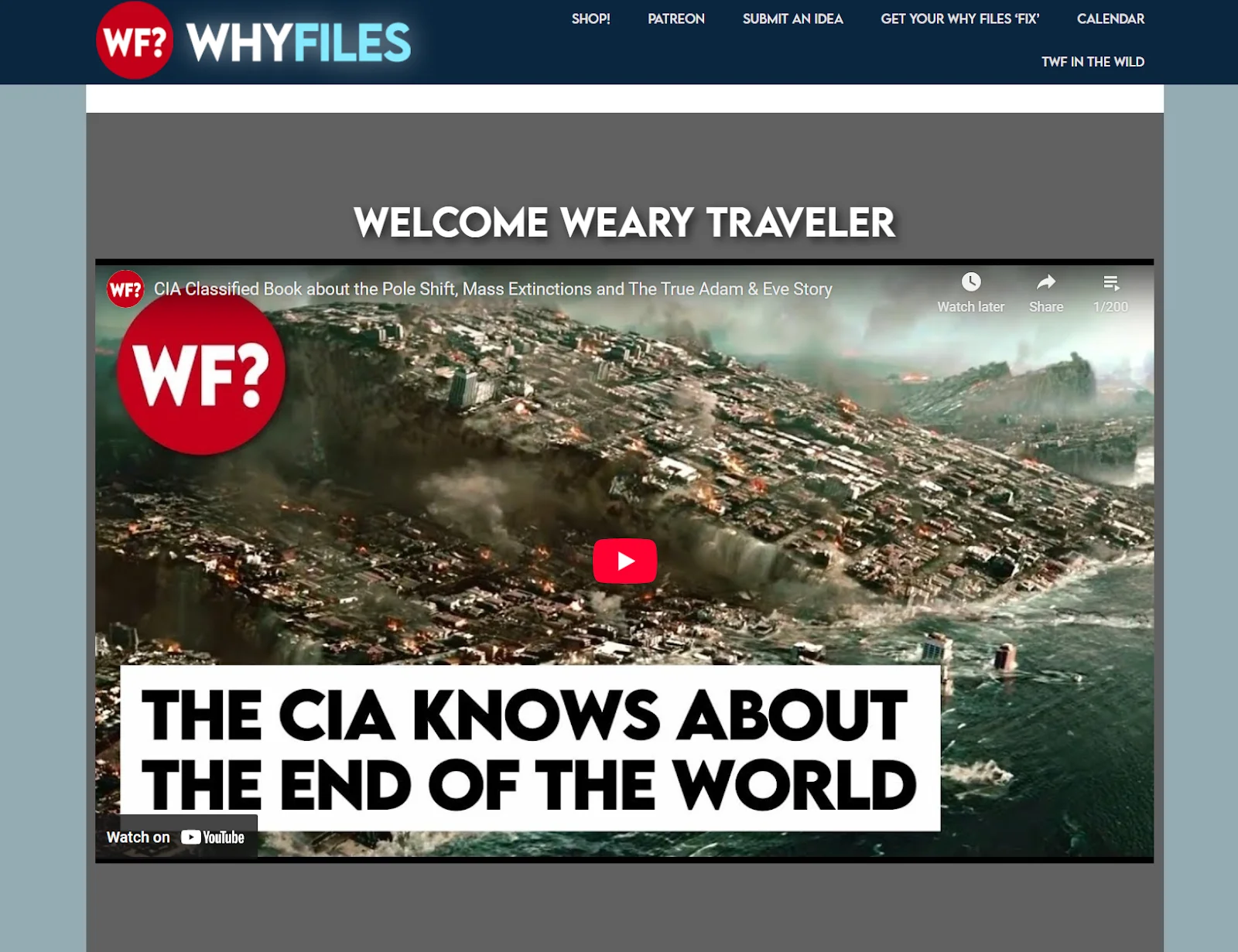
Website builder: Custom
Why we like this website:
is a simple and rough-looking website, but it’s very well-organized. The navigation links you directly to subscribe, submit an idea, or support the show. It efficiently bridges YouTube, Patreon, and a growing community by acting as a clean, central hub. Plus, it’s very much in the podcast’s style!
What stands out:
- Full episode catalog on Patreon with video embeds from YouTube.
- Dedicated merchandise store with branding that matches the podcast identity.
- Quick access to listen on Spotify, Apple Podcasts, or YouTube.
How to make a podcast website
You don’t need to be a developer to create a website for your podcast. Whether you want a quick, no-code setup or something more customizable, just follow these steps:
Step 1: Set aside a budget
How much you need to spend to create a podcast website depends on your needs and goals. Many podcast hosting platforms provide a basic landing page for your show at no extra cost, which is often enough for beginners.
For more design control, you can pay $5-$15/month for a custom domain, hosting, and a drag-and-drop website builder like Squarespace or Wix.
If you want to go all-in, you might consider hiring a web designer to build a custom WordPress site. However, expect to spend at least $500-1000 for the initial budget and ongoing maintenance.
Step 2: Choose a website platform
The website platform you’ll choose will determine the interface you’ll work with as you create it. Pick one that fits your comfort level and overall goals:
- Beginner: Podpage, Wix, and Squarespace all offer very simple, drag-and-drop interfaces that are ideal if you have no experience as a web designer.
- Advanced: WordPress or Webflow are more complex and require more technical skills to set up the backend, but they’re more flexible and customizable.
Step 3: Register a domain name
Now you need to register a domain name for your podcast—usually something simple like podcastname.com. Make sure it’s short and easy to memorize, then register it through the hosting platform like GoDaddy or Namecheap. If you’re using something like Podpage, you may be able to register your domain directly through that platform.
Step 4. Set up your site structure
Start with a homepage that’s impactful and on-brand. Make it easy for visitors to listen. You can do that by embedding episodes directly, linking to platforms like Spotify or YouTube, or creating a dedicated episodes page.
Other essentials include contact details, and a brief description of the podcast and host. You can keep everything on the homepage or create dedicated pages like “About” and “Contact”.
Then build out extras to grow and engage your audience:
- Email list signup
- Merch store
- Press/media kit
- Blog or transcript archive
- Community sections
- Premium content or behind-the-scenes access
Step 5. Add analytics and tracking
Set up tools like Google Analytics or an analytics widget to track traffic, behavior, and listener engagement. This data will help you get a better picture of what your audience likes, and how to improve your website over time.
Step 6. Optimize your website for SEO
The quickest and most efficient way to improve your SEO, is to publish a full transcript for every episode. This will make every topic and keyword discussed in your show searchable. Don’t stop there, though.
Use keyword-rich titles and descriptions for your episodes, and write a compelling summary with scannable bullet points of key takeaways.
Make sure you build a clear and easily navigable site structure so each episode has its own page. Lastly, check that your site is mobile-friendly and fast-loading, and embed your episodes so listeners stay longer in your pages.
Step 7. Launch and promote
Once your podcast website is live, it’s time to share its URL across all your social channels, mailing list, and in every episode description. Make it the central hub you always link to.
Podcast website tools to try (our top picks)
If you're ready to set up your podcast website, there is a range of website builder tools and systems you can use to get the job done. You can use a dedicated website builder like Wix or WordPress, for example. Else, you can go with a podcast host that includes built-in website features like Buzzsprout or Podbean.
To help you choose, here are some of our top picks.
Best for absolute beginners: Podpage
If you have zero experience and want a simple website with minimal effort, Podpage is built specifically for podcasters. You just drop in your RSS feed, pick a name, and it instantly generates a clean, SEO-optimized site with all your episodes.
Pros
- Instantly generates a website for podcasting based on your RSS feed.
- Auto-syncs new episodes.
- Built-in SEO and subscribe links.
Cons
- Very limited customization options.
- Some features require a paid plan.
Best for all-in-one hosting + website: Buzzsprout, Podbean, Captivate
Some podcast hosting platforms like Podbean, Buzzsprout, and Captivate offer built-in options to create your own podcast websites. You can quickly generate a mobile-friendly website with social share buttons, CTAs, and episode players. All these options are great if you want to keep things simple and have everything in one place.
Pros
- Basic site included with most hosting plans.
- Seamless integration with analytics and monetization tools.
- Can manage everything from one dashboard
Cons
- Limited customization and design control.
- Not ideal for advanced SEO or custom branding.
- Doesn’t work if your podcast is already hosted elsewhere.
Best for visual builders: Wix and Squarespace
If you want a polished look with strong visual branding, you can try Wix and Squarespace.
They let you build your site visually with a drag-and-drop interface, giving you lots of creative control. You can work from a template to speed up the process, then integrate your RSS feed with an embedded player.
Pros
- Easy drag-and-drop editor.
- Lots of templates and visual options for customized branding.
- Podcast player app available.
Cons
- Can get cluttered if not well organized.
- Less podcast-focused than Podpage or host-based tools.
- Less flexibility than WordPress.
Best for maximum control: WordPress
For the most tech-savvy users, WordPress offers unlimited flexibility. You'll need to purchase a domain, set up hosting, manage the backend, and install every plugin yourself. But the freedom and customization potential it will give you is worth the effort.
With WordPress, you can create a blog post for every episode, add custom artwork, embed media players, manage a forum, collect emails, and more. Plus, there are plenty of podcast-specific plugins to extend your site however you like.
Pros
- Full control over layout, visuals, and metadata.
- Best choice possible for SEO.
- Huge plugin ecosystem to implement all kinds of features.
- Highly scalable for large content libraries.
- Very flexible whenever you need to change, add, or remove something.
Cons
- Requires separate domain and hosting.
- Steep learning curve for setup and maintenance.
- You’re fully responsible for security and backups.
- Media files and plugins can slow down your site if not managed properly.
FAQs on podcast websites
Can I create a podcast website for free?
Yes, you can create a podcast website for free. Some podcast hosts like Buzzsprout or Podbean offer free plans that include a basic podcast website. These usually come with platform-branded URLs, limited customization, and may display ads or promotional branding. Still, it’s a solid starting point if you're testing the waters.
Otherwise, you can create a custom website with a free WordPress theme for $5-15/month. You just need to invest a small amount of money to register a domain and pay for basic hosting.
What is the best podcast recording platform?
For remote podcasting with studio-quality audio and video, Riverside is the best podcast recording platform. It records locally on each participant’s device in up to 4K video and 48kHz audio, so you get crystal-clear quality no matter your internet connection.
You can record remotely with up to 9 guests, each with their own separate audio tracks for precise editing. Plus, you’ll get a full suite of AI-powered editing tools to polish and repurpose your content for social media in minutes instead of hours. And you can even host your podcast without leaving your dashboard!
Whether you're taking your first steps as a podcaster, or scaling a professional show, Riverside makes high-quality recording simple.
Where can I create a free podcast?
You can start a podcast for free on Spotify for Podcasters, where you can record your episodes using Riverside, host, and distribute them for free. Other hosts like Podbean, Buzzsprout, or Spreaker also offer free plans for hosting your podcast, but they usually come with ads, limits on storage and features, or both.
Where do people post their podcasts?
Podcasters publish episodes through podcaster directories, which act as storefronts for your show. First, you need to upload the episode files on a hosting platform (like Spotify or Buzzsprout), which generates an RSS feed. This feed is then distributed to podcast directories, which are the platforms where listeners can play the episodes and discover new shows. Every time a new episode is published, the directory automatically pulls it via the RSS feed and shows it to the audience.
You can learn more in How to Publish a Podcast.
Which website hosts a podcast?
Which website hosts a podcast?
Podcast hosting sites are platforms where you upload and store your podcast episodes, then distribute them to listening platforms.
If you’re an audio-only podcast you can try hosting platforms like Buzzsprout or Libsyn. For video podcasts consider trying Spotify for Creators, or for an all-in-one experience try Riverside.
With Riverside, you can record, edit, and host your podcast, all in one place. You don’t even need to download and reupload your files. Just set up your podcast, add your custom thumbnails, then one-click publish to Spotify, Apple, or YouTube whenever a new episode is ready.
If you want to know more, you can check our guide on the best podcast hosting platforms.







.webp)











-(1).webp)
.webp)




